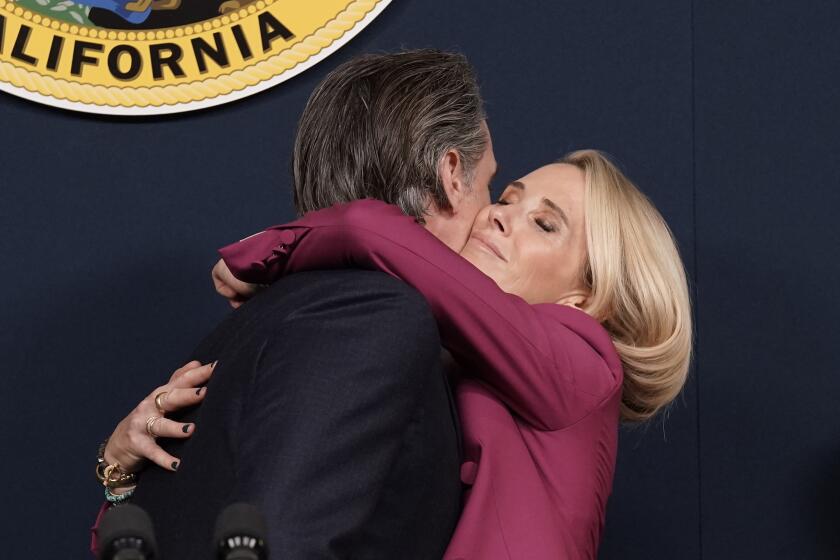Biden backs changing Senate filibuster rules as a way to codify abortion rights

Biden calls the Supreme Court’s Roe vs. Wade decision ‘destabilizing’ and says he supports changing Senate rules as a way to codify abortion protections.
- Share via
MADRID — President Biden said Thursday that the Supreme Court’s decision ending a constitutional right to abortion is “destabilizing” and that he supports changing Senate rules to codify nationwide abortion protections. He maintained the ruling does not affect U.S. standing on the world stage as he took credit for modernizing the NATO alliance to adapt to new threats from Russia and China.
Biden was speaking to reporters at the conclusion of a five-day foreign trip to huddle with North Atlantic Treaty Organization allies in Madrid and the leaders of the Group of 7 advanced democratic economies in the Bavarian Alps, which came as the nation was still grappling with the fallout from Friday’s Supreme Court decision.
“America is better positioned to lead the world than we ever have been,” Biden said. “But one thing that has been destabilizing is the outrageous behavior of the Supreme Court of United States in overruling not only Roe v. Wade, but essentially challenging the right to privacy.”
He added: “I could understand why the American people are frustrated because of what the Supreme Court did.”
Senate Constitutional Amendment 10 would, if approved by voters, further codify the state’s already progressive reproductive rights.
Biden said he would support changing the Senate filibuster rules, which require 60 votes to pass most legislation, to allow a bill extending nationwide abortion protections to pass by simple majority, but he said it would likely require voters to send additional Democratic senators to Washington to get done.
The fall of Roe vs. Wade has shifted the battleground over abortion to courthouses around the country, as abortion foes looked to quickly enact statewide bans and the other side sought to buy more time.
The three-day NATO summit included the Biden administration announcing plans to permanently bolster the U.S. military presence in Europe, an agreement among Turkey, Finland and Sweden to pave the way for the Nordic nations to join NATO, and the alliance updating its strategic concept reflect that China’s “coercive policies” are a challenge to the Western bloc’s interests.
“I think we can all agree that this has been a historic NATO summit,” Biden said.
California’s governor clearly embraces his rise as a dominant, resonating voice for Democratic states nationwide
He noted the last time NATO updated what is essentially its mission statement was 12 years ago, when Russia was characterized as a partner, and the document didn’t even mention China.
“The world has changed, changed a great deal since then,” Biden said. “This summit was about strengthening our alliances, meeting the challenges of our world as it is today and the threats we’re going to face in the future,” Biden said.
Biden also highlighted announcements at the G-7 meeting, including more economic and military assistance to Ukraine as it aims to beat back Russia’s four-month invasion, and announcements on tougher sanctions meant to punish Moscow.
NATO gets blowback from Moscow and Beijing after it declared Russia a ‘direct threat’ and said China posed ‘serious challenges’ to global stability.
“We are going stick with Ukraine and all of the alliance is going to stick with Ukraine as long as it takes,” Biden said. “I don’t know what it how it’s going to end, but it will not end with a Russian defeat of Ukraine in Ukraine.”
More to Read
Get the L.A. Times Politics newsletter
Deeply reported insights into legislation, politics and policy from Sacramento, Washington and beyond. In your inbox twice per week.
You may occasionally receive promotional content from the Los Angeles Times.














